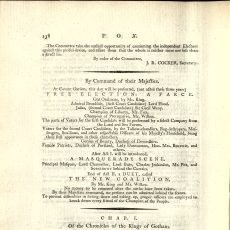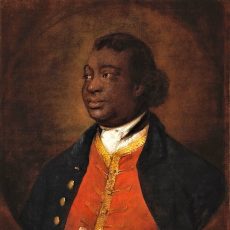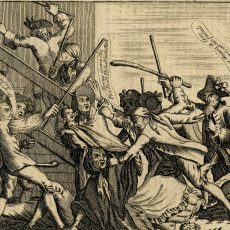Aug
1830
bristol
Contested
GENERAL ELECTION
Poll book data from:
Citation: The Bristol poll book… (Bristol: Philip Rose, 1830)
Source: John Sims (ed.), A Handlist of British Parliamentary Poll Books (Leicester, 1984); Jeremy Gibson and Colin Rogers (eds.), Poll Books, 1696–1872: A Directory of Holdings in Great Britain (4th edn., Bury, 2008); L. W. L. Edwards (ed.), Catalogue of Directories and Poll Books in the Possession of the Society of Genealogists (4th edn., 1984).
Timeline & Key Statistics
Contexts & Remarks
Dates: Friday 30 July-Thursday 5 Aug. 1830.
Poll book reference: The Bristol poll book... (Bristol: Philip Rose, 1830).
The poll book is prefaced by the addresses of the candidates 'without note or comment'.
History of Parliament estimates that Bristol had an electorate of about 7,000 in c.1830, of which 6,384 voted (91 per cent turnout).
Candidates: Richard Hart Davis (Tory); James Evan Baillie (Whig); Edward Protheroe Jr. (Whig); and James Acland (Radical).
Richard Hart Davis had been elected MP for Bristol in the by-election of 1812. A Bristolian banker and merchant who traded to the West Indies and was a member of the Society of Merchant Venturers, he opposed Catholic Emancipation.¬? His campaign was organized and secured by Tory Henry Bush, ensuring that Davis could 'avoid the fatigue of appearing on the hustings ... on account of ... health'.
James Evan Baillie was the brother of Hugh Baillie, who ran for election in 1818, and the son of former MP Evan Baillie. He was supported by a group of West India Planters' interest Whigs who competed against Bristol's abolitionists for representation in Parliament. It is a sign of their popular support that Baillie's public entry into Bristol was reportedly 'upwards of half a mile' long. His electoral expenses amounted to around £18,000.
James Acland was the editor of the Bristolian, a paper which libelled Bristol's corporation and resulted in Acland's imprisonment.
Edward Protheroe Jr, son of Edward Protheroe who had served as MP for Bristol from 1812 to 1820, had himself served in Parliament for Evesham. To gain the support of Bristol's Whigs, he declared that he supported the abolition of slavery, a position which 'lost the support of many friends'. He was determined to run on the 'moral strength' of his campaign rather than incur extravagant election expenses like his competitors. Protheroe Jr understood the popularity of the West India Planters' interest in Bristol, but was optimisitic; 'the struggle will be considered as a trial of strength between the West India interest and the abolitionists ... Already I am threatened not only with the united wealth and forces of the former in Bristol, but with the active co-operation in their behalf of the same interest in London' (Brougham Mss, Protheroe to Brougham, 22 July 1830).
Following Baillie's entry into Bristol, violence broke out between Baillie and Protheroe's supporters. Throughout the campaign, Baillie's supporters met at the Rummer public house, while Protheroe's met at the Bush. In July 1830, '60 to a 100 sailors and ships' carpenters, in a dreadful state of ... intoxication and armed with common bludgeons' attacked the Bush, prompting a rival mob to attack the Rummer. The violence sent 27 people to the infirmary. Placards filled Bristol's streets and concerned campaigners took to the newspapers. One 'Brother Freeman' wrote, 'vote for Protheroe and you promote your own freedom as well as that of the poor negro'. Baillie's supporters dubbed Protheroe 'Negro Ned', playing up the fear that the abolition of the trade in enslaved peoples would trigger the 'loss of our colonies and consequently all that part of our transatlantic trade'.
A show of hands for Davis and Protheroe prompted formal polling in Queen Square. After five days of polling, Davis and Baillie were elected for Bristol. However, no chairing procession took place. Acland petitioned Baillie's return, though the petition was ultimately withdrawn.
People & Places
Poll Book
Below is a digitised version of the poll book for this election:





